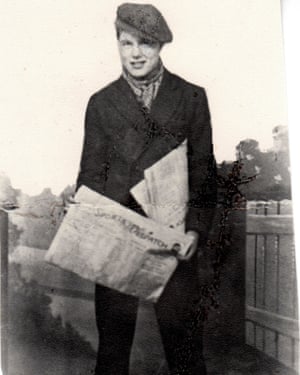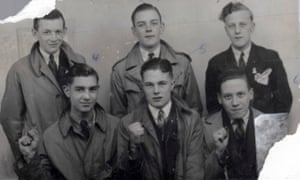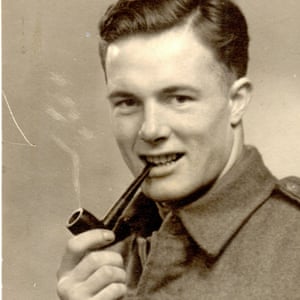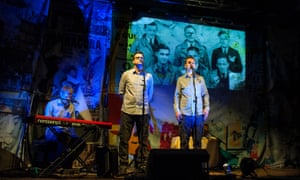⇩ Use your ears. Click below to hear this post.
|
|
A 17-year-old who ‘couldn’t find Spain on a map’ walked across the Pyrenees to join the Spanish civil war’s freedom fighters. Folk trio the Young’uns explain how Johnny Longstaff’s extraordinary life inspired their latest album
It began nearly four years ago in Clevedon. We were in the North Somerset coastal town to do a gig. After the show, a man approached us. People often do; we love to hear their responses to our songs. The man introduced himself as Duncan and handed us two pieces of paper.
One was a photograph from the 1930s of a scruffy teenager selling newspapers on a street corner. “That’s my dad,” he said. The second was a list. “That’s what he did.” It read like a checklist of working-class struggle in the 20th century. Hunger marches, mass trespasses, the Battle of Cable Street, travelling to Spain to fight against the fascists in the Spanish civil war.
Because the three of us in the Young’uns shared the same birthplace as his dad – Stockton-on-Tees – and because we’d sung about the fight against fascism there, Duncan hoped we might be inspired to write a song about his dad, Johnny Longstaff.

It felt like we’d discovered a forgotten working-class hero. We wanted to know more.
Duncan bombarded us with treasures from his father’s life. Johnny Longstaff’s entire library of Spanish civil war literature arrived at my door, his name and rank written neatly inside every cover and the margins filled with his furious “corrections” – typically “That didn’t happen – I was there!”
Next came his dad’s unpublished memoirs including stories of childhood poverty in Stockton – imagine being so hungry that you steal candles from a church to eat them. Johnny’s photo archive brought the people and events we’d been reading about to life. I loved that because he’d learned to drive in the desert in a tank during the war he was a menace on the roads well into middle-age.
Just before he died, Johnny had recorded his life story for the Imperial War Museum. We listened to the tapes. We were enthralled. It became clear that one song wasn’t going to be enough.
We immersed ourselves in Johnny’s 1930s world, reading the books he read and listening to the songs he sang. We discovered things we certainly hadn’t known.

How there were several hunger marches to London throughout the 1920s and 30s, not just the Jarrow Crusade of 1936. Scornful students greeted the marchers in Cambridge by throwing eggs at them. We learned about lost, overlooked and unlikely heroes of the Labour movement who had also gone to fight fascism in Spain; figures such as Lewis Clive, who was an Olympic rowing champion and the inspiration for Oliver in Mary Wesley’s book The Camomile Lawn. Johnny was with him when he died in Spain at the Battle of the Ebro.
Like many musicians, we’ve been inspired by Charles Parker, Ewan MacColl and Peggy Seeger’s groundbreaking BBC Radio Ballads of the 1950s, documentaries that wove original songs around oral testimonies, and, radically for the time, put working-class voices on to the nation’s airwaves. Why not do the same with Johnny’s story, we thought, using his own voice and our own songs to create something unlike anything we’d done before.
The piece quickly developed a narrative too – of how a 17-year-old boy from the north of England who “didn’t even know what sex was” and who “couldn’t find Spain on a map” became determined to defy the wishes of his own government and fight for democracy in a foreign land. He wasn’t alone. More than 2,500 men and women from Britain and Ireland also chose to fight in what many now see as the precursor to the second world war.
We wanted to portray the simple humanity of Johnny’s journey and show that his radical politics were not born out of ideology but from seeing poverty and oppression first-hand.

Johnny had become determined to campaign for equality when he witnessed the huge gap between rich and poor while sleeping rough in 1930s London. He was determined to fight fascism after he met Jewish refugees from Nazi Germany and was horrified at the stories they told him. He was smuggled to Paris and then walked through the Pyrenees to get to Spain, and joined the International Brigade. He was wounded three times (once temporarily blinded) and was incredibly lucky to come back alive.
Only a few weeks after he returned in the summer of 1939 he went to Westminster to meet his local MP. Winston Churchill happened to be passing and Johnny was introduced to him as a young socialist soldier just returned from Spain. Churchill looked suspiciously at the 19-year-old and asked “would men like you be prepared to fight Hitler?” “I’ve been fighting Hitler all my life,” answered Johnny.
On the first day of the second world war, Johnny went to enlist, but was turned away – because he had fought in Spain. He didn’t give up, and became a sergeant, fought at El Alamein and Monte Cassino, and was rewarded for gallantry. Back home, he married Pauline, raised a family and became a rather reluctant civil servant. He told his children much about his early life but kept from them the true extent of the horrors of war.
By early 2018 the story and 16 songs were ready. With help from the remarkable Cally of Antar.cc we created a live show that plunges audiences into Johnny’s world. Photographs and newspaper cuttings are projected onto a backdrop of peeling Spanish street posters. A copy of a revolutionary newspaper is on every seat and Johnny’s own voice comes from a 1930s-style radio.

Our first tour ended in Stockton-on-Tees, almost 100 years after Johnny had been born there. Three generations of Longstaffs lined the front row. At the end of the show we pointed them out to the audience, and the people of Teesside rose to their feet to applaud them. We all cried.
After that show someone else came up to chat. “There must have been thousands of Johnny Longstaffs out there whose stories will never be heard,” he said. That’s true, but I hope Johnny can speak for them. I think he’d be glad of that.
